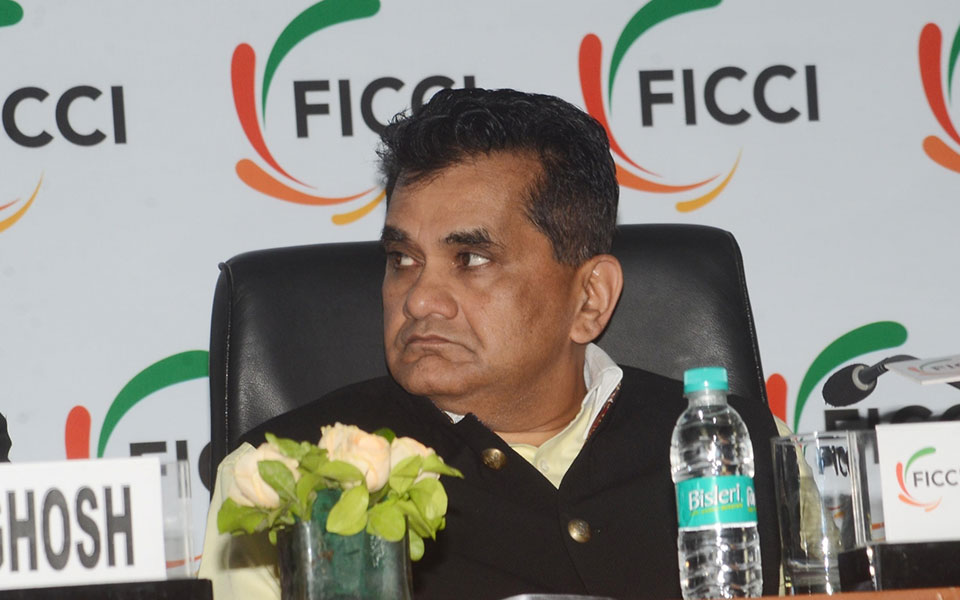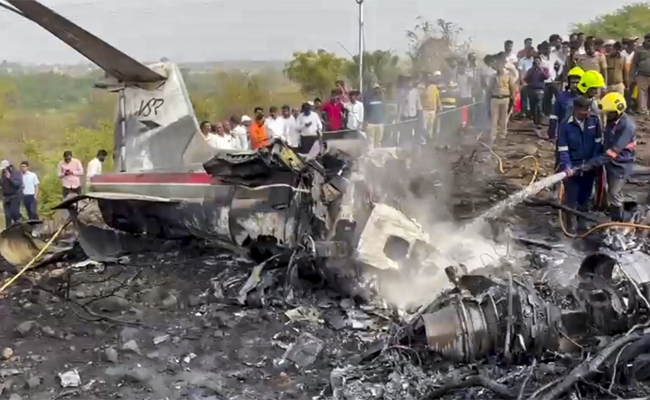New Delhi, July 2: Pushing for greater integration in the Saarc region, NITI Aayog CEO Amitabh Kant on Monday said the South Asian region will remain backward until it pushes for greater trade, greater investments and more tourism within the region.
He said the South-Asian region was the least integrated region in the world with virtually no intra-regional trade.
Kant said that on one hand, over 97 per cent of tourists come to India via air from other countries, most Indian tourists also travel to the Southeast Asian region.
The NITI Aayog CEO pushed for greater intra-region tourism to boost growth and even encouraged Indians to travel to Pakistan, and vice versa.
"Why should Indian tourists go to Malaysia, Singapore and Thailand? Why shouldn't they travel to Bhutan, Afghanistan or Pakistan? We should travel to each other's countries. We have made things so difficult politically that we are not able to benefit from all this (intra-region tourism)," he said at the SAARC Development Fund (SDF) Partnership Conclave here.
"If you look around the world, most of the trade, investment and tourism is intra-regional in character. Therefore most of growth has taken place in those regions, and poverty eliminated, because of intra-regional work. If you look at America or Europe, it's all intra-regional," he added.
Kant said there was virtually no intra-regional trade in the Saarc region.
"In terms of tourism, 97.2 per cent of tourists come to India via air from abroad. So there is no intra-regional travel and tourism. And therefore the multiplier impact of trade, or tourism, or investments has not benefited the country. And that's why South Asia remains the region with maximum poverty," he said.
"South Asia as a region has been severely hampered and it will remain backward till we don't integrate the region and till we don't push for greater trade, greater investments, and greater travel and tourism within the region," he added.
Kant said that growth in India and its neighbouring countries will not come from other regions like America or Europe, but it will be the political will, determination and bonding together of the Saarc countries which will enable growth and eliminate poverty.
"That's how it has happened in other parts of the world. But unfortunately, it hasn't happened here," he said.
The NITI Aayog CEO also pushed for more employment opportunities for women saying that they contribute only 25 per cent to GDP in the Saarc region compared to 48 per cent contribution to the GDP in the rest of the world.
He said the region cannot grow until this changes and a conscious policy was needed to promote employment for women and to empower them.
Let the Truth be known. If you read VB and like VB, please be a VB Supporter and Help us deliver the Truth to one and all.
Mumbai (PTI): Transporters across Maharashtra on Thursday launched a statewide “chakka jam” to protest against “arbitrary and excessive” e-challans and other issues faced by the sector, and threatened to go on an indefinite strike from midnight.
The state Transport Commissioner’s office has directed all Regional Transport Offices (RTOs) to activate separate control rooms in their jurisdictions to track the protest and share information about any incident that could lead to a law and order situation, an official said.
After the last round of negotiations held at the Maharashtra Transport Commissioner’s office on Wednesday evening remained inconclusive, the Maharashtra Transport Action Committee (M-TAC) said that it would go ahead with the strike.
According to M-TAC representatives, transporters will stage protests at Azad Maidan in Mumbai and outside the Regional Transport Office (RTO) premises in other parts of the state before going on strike from midnight.
M-TAC said school buses, contract carriage buses, private buses and commercial vehicles, including trucks, tempos, taxis and tankers, would remain off the roads during the indefinite agitation. The transporters have also threatened to bring their vehicles to protest sites.
Anil Garg, a leader of the School Bus Owners Association, had said on Wednesday that school buses across the state would not operate from Friday if the indefinite strike happened, though their services would remain unaffected on Thursday.
Earlier this week, Maharashtra Transport Minister Pratap Sarnaik also held a meeting with transporters at the MSRTC headquarters here, but M-TAC said the talks remained unfruitful due to what it described as “hollow assurances” from the government.
Sarnaik had appealed to the transporters to withdraw their agitation, stating that the government was positive about cancelling “unjust” e-challans issued to parked vehicles and would take a favourable decision on the matter.
A senior department official said that the Transport Commissioner’s office has asked all RTOs to activate control rooms and alert it in the case of any incident with the potential to create a law and order situation.
All RTOs have been asked to submit a detailed and factual report before 5 pm every day till the strike continues, the official said.
The report should include information such as the impact of the strike in their jurisdiction, the status of essential commodities and passenger movement, preventive steps taken to provide relief to the public, and issues faced during the strike, he said.
M-TAC said the agitation is being organised against what it termed “arbitrary and excessive” electronic traffic enforcement and the mounting financial burden on the transport sector.
The charter of demands submitted by M-TAC to the government earlier this year includes major reforms to the e-challan system, a waiver of pending fines and a reduction in taxes and toll charges imposed on commercial vehicles.
M-TAC leaders claimed the e-challan system has caused hardship not only to transport operators but also to ordinary vehicle owners.
The action committee has also sought the withdrawal or relaxation of a proposed amendment to rules issued in January 2026, requiring transporters to clear e-challan penalties within 45 days, failing which they would face restrictions on essential services such as permit renewal, fitness certification and other regulatory approvals.
“As per Rule 468 and amended Rule 514 of the Code of Criminal Procedure, all time-barred e-challans should be cancelled if cases are not filed in court,” the charter of demands stated.
M-TAC has also demanded the closure of highway check posts and the establishment of rest houses or centres for drivers. It has sought fire tenders and emergency service facilities on highways, provisions for parking lots, bus stops and cargo loading and unloading facilities.
The transporters have further called for a review of the repeated retrofitting of devices such as panic buttons, vehicle location tracking devices, high-security registration plates, fire detection and suppression systems, and CCTV cameras, which they claim are mandated under the pretext of safety.
They have demanded the suspension of what they described as unfeasible and abrupt “no entry” restrictions that cause operational difficulties and have urged the government to adopt a more consultative approach.





